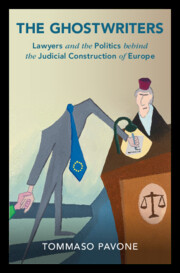Book contents
- Frontmatter
- Contents
- Figures
- Table
- Acknowledgments
- Part One Introduction
- Part Two Judges and Resistance to Change
- Part Three Lawyers and the Uneven Push for Change
- Part Four Lawyers and the Rise of Contentious Politics
- 7 Euro-Lawyering Goes Public: Interpretive Mediation and the Politics of Compliance
- 8 Euro-Lawyering Goes Silent: Resistance, Conspiracy, and the Politics of Backlash
- Part Five Conclusion
- Appendix
- Bibliography
- Index
7 - Euro-Lawyering Goes Public: Interpretive Mediation and the Politics of Compliance
from Part Four - Lawyers and the Rise of Contentious Politics
Published online by Cambridge University Press: 31 March 2022
- Frontmatter
- Contents
- Figures
- Table
- Acknowledgments
- Part One Introduction
- Part Two Judges and Resistance to Change
- Part Three Lawyers and the Uneven Push for Change
- Part Four Lawyers and the Rise of Contentious Politics
- 7 Euro-Lawyering Goes Public: Interpretive Mediation and the Politics of Compliance
- 8 Euro-Lawyering Goes Silent: Resistance, Conspiracy, and the Politics of Backlash
- Part Five Conclusion
- Appendix
- Bibliography
- Index
Summary
Chapters 7 unpacks how lawyers can serve as brokers of compliance when controversial judicial decisions spark backlash. As European integration became politicized from the 1990s onwards, disruptive European Union (EU) laws and European Court of Justice (ECJ) decisions have often provoked on-the-ground resistance. Yet these controversies can also open surprising opportunities for court-driven change, provided that Euro-lawyers mobilize as "interpretive mediators:" Public advocates who vernacularize EU law and rally local stakeholders and the press to promote compliance. The chapter develops a case study design to compare lawyers' role in two explosive controversies that generated litigation before the ECJ: The 1991 Port of Genoa case (analyzed in this Chapter), which quashed the control over port labor of a centenarian union of dockworkers, and the 2015 Xylella case (analyzed in Chapter 8), which mandated the eradication of thousands of centenarian olive trees. The chapter traces how Euro-lawyers in the Port of Genoa case preempted backlash and promoted compliance by mobilizing public and interest group support via media savvy advocacy. It speaks to readers interested in how contentious politics transform legal mobilization, how lawyers cultivate people's legal consciousness when the law is politicized, and how these efforts shape judicial policymaking and Europeanization.
Keywords
- Type
- Chapter
- Information
- The GhostwritersLawyers and the Politics behind the Judicial Construction of Europe, pp. 241 - 278Publisher: Cambridge University PressPrint publication year: 2022

